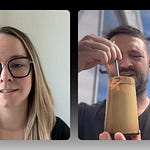The spark
Seth’s short post, “The Other Backpacks,” paints a vivid picture:
Every hiker is intimately aware of their own backpack—how it fits, what’s inside, what’s heavy, what’s rubbing them raw. But they probably couldn’t tell you much about anyone else’s backpack, except that everyone has one. That’s the first step toward empathy: realizing that everyone else has a backpack, and it’s different from yours.
Simple. True. Transformative.
—
Holly’s take (on the road from Houston)
Driving past The Hobbit Café—yes, the Tolkien‑themed one with Reubens fit for the Shire—Holly was reminded how every great story is about a journey. And every journey involves carrying what matters most.
At work, we obsess over our own backpacks: our responsibilities, goals, frustrations, and the weight that digs into our shoulders. But we rarely pause to wonder what others are hauling.
Holly connected this to her recent leadership sessions with a Houston‑based company whose culture thrives even in an unglamorous industry. There, she teaches managers to think of development plans as backpacks—each team member needs one, packed intentionally with the tools and experiences that will help them grow. Leaders help people pack well.
Whether you’re climbing a ladder or scaling a rock wall, you carry what you’ve chosen. And you carry it differently than the person beside you.
—
Daniel’s reflection
The line that sticks: “They know which straps are digging into their skin.”
We all have spots that rub raw—wounds, fears, grief, or invisible stress. Empathy begins when we assume those spots exist, even when they don’t show.
I think of interactions that felt cold or clipped. My first instinct was judgment; my second, empathy. Maybe they were just managing a heavier load that day.
—
The playbook: Building empathetic awareness
Notice the weight. Assume everyone you meet is carrying something heavy, even if they smile.
Lighten their load. Ask one genuine question today: “What’s been hardest for you lately?” Then actually listen.
Share what’s in yours. Vulnerability multiplies empathy. Model it first.
Pack with intention. Review what’s in your own backpack this season—skills, habits, hurts, hopes. Keep what’s useful; offload what isn’t.
Equip others. If you lead, help your team pack better: development plans, honest feedback, clear goals.
—
Try this this week
Pick one person whose backpack you’ve overlooked.
Imagine what might be inside—responsibilities, stress, fears—and let that soften your tone.
Ask a question that gives them space to share, not defend.
—
Why it matters
Empathy isn’t soft—it’s strategic. Teams move faster when they trust each other. Leaders earn loyalty when they care enough to notice the unseen weight. And relationships deepen when we remember: everyone’s backpack looks different, but everyone’s carrying something.
—
Your turn
Whose backpack have you ignored lately? What could change if you paused long enough to notice it? Share your reflections below so we can learn—and lighten the load—together.















